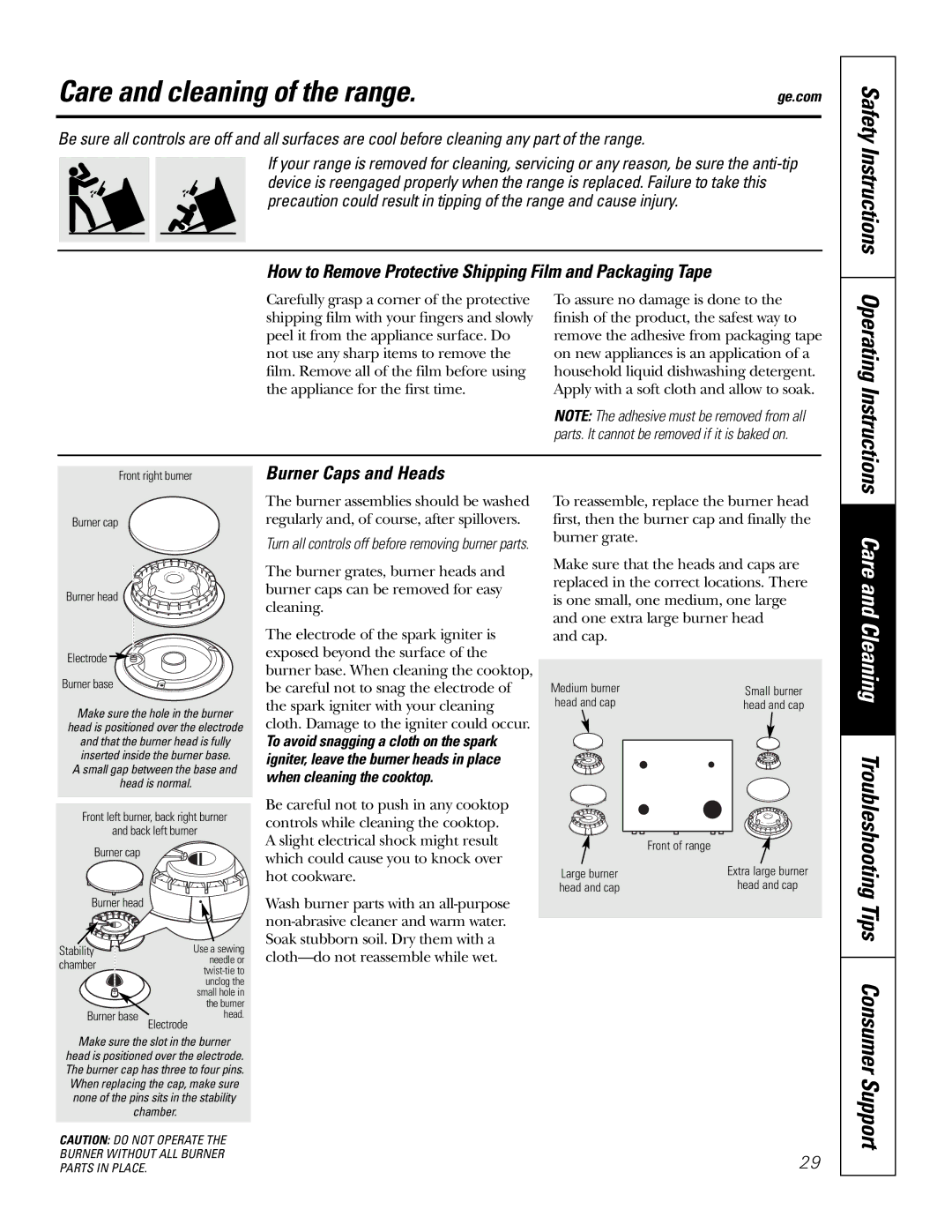
Care and cleaning of the range. | ge.com |
Be sure all controls are off and all surfaces are cool before cleaning any part of the range.
If your range is removed for cleaning, servicing or any reason, be sure the
How to Remove Protective Shipping Film and Packaging Tape
Safety Instructions
Carefully grasp a corner of the protective shipping film with your fingers and slowly peel it from the appliance surface. Do not use any sharp items to remove the film. Remove all of the film before using the appliance for the first time.
To assure no damage is done to the finish of the product, the safest way to remove the adhesive from packaging tape on new appliances is an application of a household liquid dishwashing detergent. Apply with a soft cloth and allow to soak.
NOTE: The adhesive must be removed from all parts. It cannot be removed if it is baked on.
Operating Instructions
Front right burner
Burner cap
Burner head
Electrode![]()
Burner base
Make sure the hole in the burner head is positioned over the electrode and that the burner head is fully inserted inside the burner base.
A small gap between the base and
head is normal.
Front left burner, back right burner
and back left burner
Burner cap
Burner head
Stability | Use a sewing | |
chamber | needle or | |
| ||
| unclog the | |
| small hole in | |
| the burner | |
Burner base | head. | |
Electrode |
Make sure the slot in the burner head is positioned over the electrode. The burner cap has three to four pins. When replacing the cap, make sure none of the pins sits in the stability chamber.
Burner Caps and Heads
The burner assemblies should be washed regularly and, of course, after spillovers.
Turn all controls off before removing burner parts.
The burner grates, burner heads and burner caps can be removed for easy cleaning.
The electrode of the spark igniter is exposed beyond the surface of the burner base. When cleaning the cooktop, be careful not to snag the electrode of the spark igniter with your cleaning cloth. Damage to the igniter could occur.
To avoid snagging a cloth on the spark igniter, leave the burner heads in place when cleaning the cooktop.
Be careful not to push in any cooktop controls while cleaning the cooktop. A slight electrical shock might result which could cause you to knock over hot cookware.
Wash burner parts with an
To reassemble, replace the burner head first, then the burner cap and finally the burner grate.
Make sure that the heads and caps are replaced in the correct locations. There is one small, one medium, one large and one extra large burner head
and cap.
Medium burner |
|
|
|
|
|
|
|
|
|
|
| Small burner |
head and cap |
|
|
|
|
|
|
|
|
|
|
| head and cap |
|
|
|
|
|
|
|
|
|
|
|
|
|
|
|
|
|
|
|
|
|
|
|
|
|
|
|
|
|
|
|
|
|
|
|
|
|
|
|
| Front of range |
Large burner | Extra large burner |
head and cap | head and cap |
Care and Cleaning Troubleshooting Tips Consumer Support
CAUTION: DO NOT OPERATE THE BURNER WITHOUT ALL BURNER PARTS IN PLACE.
29
